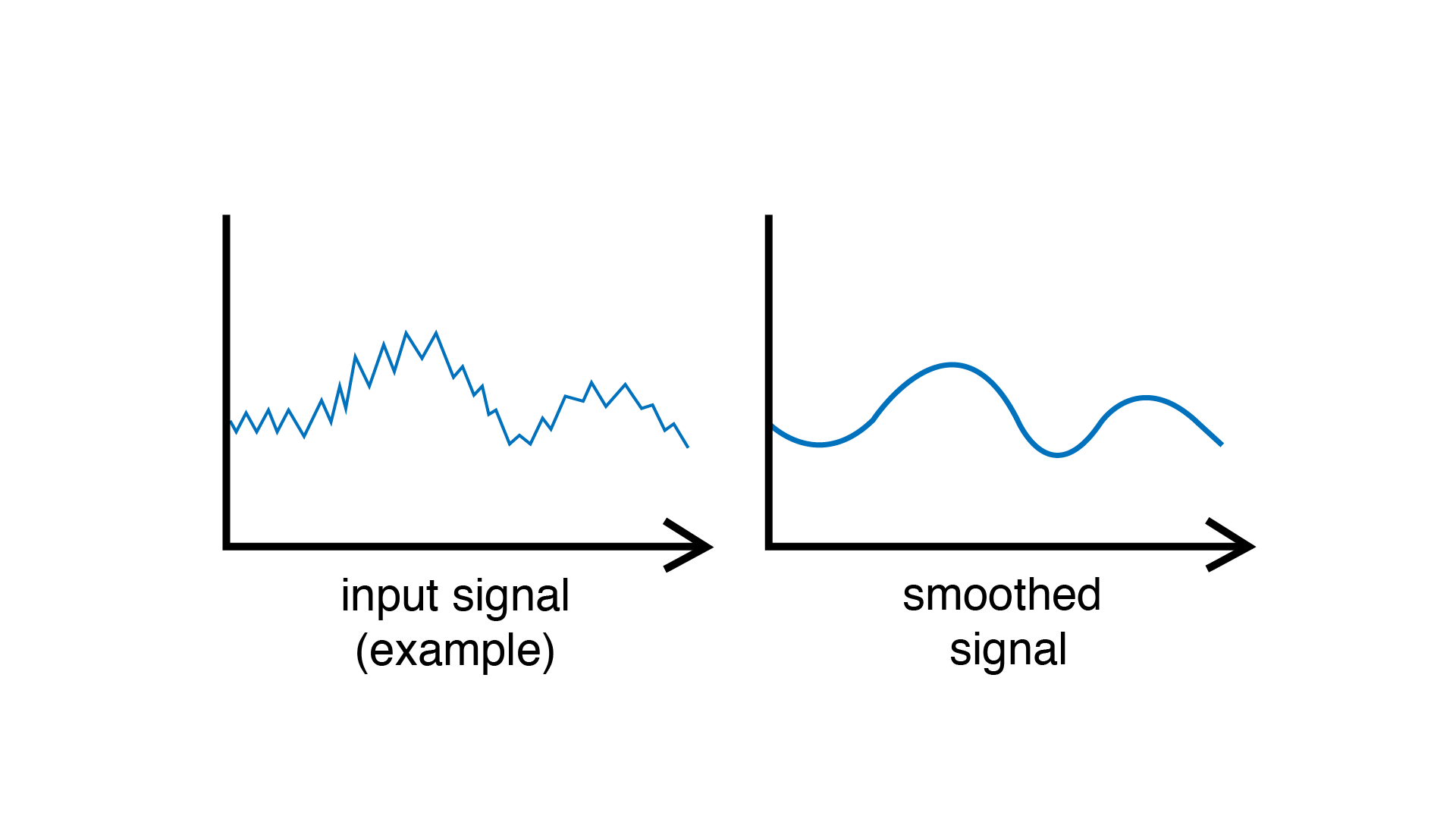Smoother
Smooths the incoming signal by removing fast variations and noise (high frequencies).

Example
Smooth a sensor over time.
#include <Plaquette.h>
AnalogIn sensor(A0);
// Smooths over time window of 10 seconds.
Smoother smoother(10.0);
Plotter plotter(115200); // Initialiaze serial plotter at 115200 bps
void step() {
// Smooth value and send it to serial output.
sensor >> smoother >> plotter;
}
Note
The filter uses an exponential moving average which corresponds to a form of low-pass filter.
Reference
-
class Smoother : public pq::MovingFilter
Simple moving average transform filter.
Public Functions
-
Smoother(Engine &engine = Engine::primary())
Constructor with default smoothing.
- Parameters
engine – the engine running this unit
-
Smoother(float timeWindow, Engine &engine = Engine::primary())
Constructor with smoothing window.
- Parameters
timeWindow – the time window over which the smoothing applies (in seconds)
engine – the engine running this unit
-
virtual void reset()
Resets the filter.
-
virtual void reset(float estimatedMeanValue)
Resets the filter with a prior estimate of the mean value.
-
virtual void reset(float estimatedMinValue, float estimatedMaxValue)
Resets the moving filter with a prior estimate of the min and max values.
-
virtual float put(float value)
Pushes value into the unit.
- Parameters
value – the value sent to the unit
- Returns
the new value of the unit
-
virtual float filter(float value)
Returns the filtered value (without calibrating).
-
virtual void resumeCalibrating()
Switches to calibration mode (default).
Calls to put(value) will return filtered value AND update the normalization statistics.
-
virtual void pauseCalibrating()
Switches to non-calibration mode: calls to put(value) will return filtered value without updating the normalization statistics.
-
virtual void toggleCalibrating()
Toggles calibration mode.
-
virtual bool isCalibrating() const
Returns true iff the moving filter is in calibration mode.
-
inline unsigned int nSamples() const
Returns the number of samples that have been processed thus far.
-
inline virtual bool isPreInitialized() const
Returns true if the moving filter has been initialized with a starting range at reset.
-
inline virtual float get()
Returns value in [0, 1].
-
inline virtual float mapTo(float toLow, float toHigh)
Maps value to new range.
-
inline float seconds() const
Returns engine time in seconds.
-
inline uint32_t milliSeconds() const
Returns engine time in milliseconds.
-
inline uint64_t microSeconds() const
Returns engine time in microseconds.
-
inline unsigned long nSteps() const
Returns number of engine steps.
-
inline float sampleRate() const
Returns engine sample rate.
-
inline float samplePeriod() const
Returns enginesample period.
-
inline operator float()
Object can be used directly to access its value.
-
inline explicit operator bool()
Operator that allows usage in conditional expressions.
-
virtual void infiniteTimeWindow()
Sets time window to infinite.
-
virtual void noTimeWindow()
Sets time window to no time window.
-
virtual void timeWindow(float seconds)
Changes the time window (expressed in seconds).
-
inline virtual float timeWindow() const
Returns the time window (expressed in seconds).
-
inline virtual bool timeWindowIsInfinite() const
Returns true if time window is infinite.
-
virtual void cutoff(float hz)
Changes the time window cutoff frequency (expressed in Hz).
-
virtual float cutoff() const
Returns the time window cutoff frequency (expressed in Hz).
-
Smoother(Engine &engine = Engine::primary())